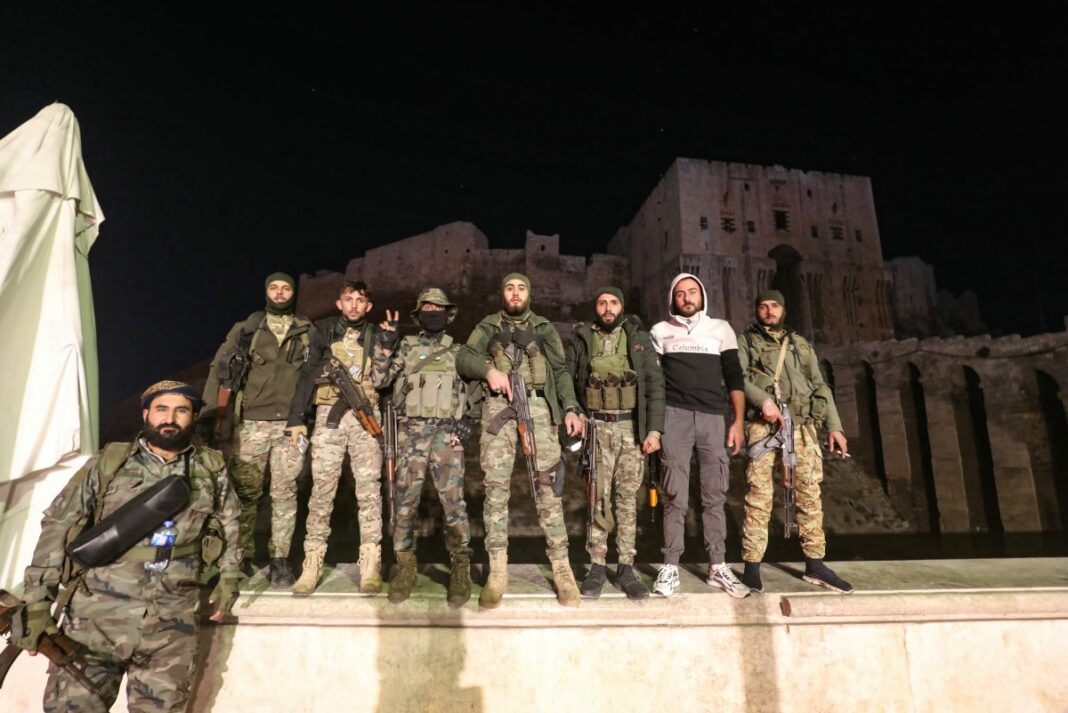Fatih Yurtsever*
Turkey’s involvement in the recent Aleppo offensive conducted by Syrian rebels, led by militants of Hayat Tahrir al-Sham (HTS), has drawn significant international attention, with allegations of providing military and logistical support to HTS. According to Russia analyst Kerim Has, the group’s operation would not have been possible without Ankara’s consent, highlighting Turkey’s strategic interests in reshaping the balance of power in northern Syria.
The HTS-led offensive in Aleppo has disrupted years of fragile stability in northern Syria. In a rapid campaign, the group has captured most of Aleppo, Syria’s second largest city and key territories, including strategic positions along the Aleppo-Damascus (M5) highway, effectively cutting off crucial supply routes for the Assad regime. Investigative journalist Fehim Taştekin notes that this marks a critical setback for the Syrian army, which has struggled to mount an effective defense due to its stretched resources and diminishing control in the region.
HTS is a coalition of jihadist groups that is fighting against the government of Syrian President Bashar al-Assad. It was created in 2017 based on the jihadist organization Jabhat al-Nusra (recognized as a terrorist organization by Turkey), which was established at the beginning of the civil war in Syria, in 2012, as a local affiliate of al-Qaeda (also recognized as a terrorist organization by Turkey).
The coalition currently denies any connection with the latter. De facto, the fighting unit of Jabhat al-Nusra no longer exists, although some field commanders continue to be part of HTS and even carry its old symbols.
Analyst Ömer Murat, a former Turkish diplomat, highlights HTS’ enhanced military capabilities, particularly in drone warfare, as a defining feature of the operation. This technological advancement has not only strengthened HTS on the battlefield but also demonstrated the group’s ability to adapt and innovate in response to persistent Russian and Syrian bombardments.
Russia expert Has also contends that HTS’ success would have been unthinkable without Turkey’s military and logistical backing. Ankara’s provision of advanced weaponry and its coordination with HTS align with broader strategic goals, including countering Kurdish influence in northern Syria and positioning itself as a key powerbroker in the region.
Turkey’s dual agenda is evident. While Ankara officially denies direct involvement, Ömer Murat underscores that Erdoğan is using the offensive to leverage Turkey’s regional position. He notes potential collaboration with Israel and even the United States in exploiting Hezbollah’s weakened state, thereby reshaping the dynamics of power in northern Syria. This collaboration, Murat suggests, signals a deeper geopolitical strategy aimed at expanding Turkey’s influence while marginalizing Kurdish groups like the People’s Protection Units (YPG).
The YPG is a predominantly Kurdish militia that operates in northern Syria and has been a key force in the fight against the Islamic State in Iraq and the Levant, while also serving as the armed wing of the Kurdish-led Syrian Democratic Forces and advocating for Kurdish autonomy in the region.
Moscow’s condemnation of the offensive as a violation of Syrian sovereignty reflects its frustration, but its actions remain limited. Has attributes this to Russia’s diversion of resources to the war in Ukraine, leaving Assad’s forces vulnerable. Journalist Taştekin notes that Russian military support, once decisive in sustaining Assad’s regime, has significantly diminished, allowing HTS to exploit gaps in the Syrian army’s defenses.
Iran’s diminished capacity in the region has also played a crucial role. Recent Israeli strikes have severely weakened Hezbollah, one of Tehran’s key proxies, with Murat estimating heavy casualties and a leadership crisis within the organization. While Iran has sent reinforcements from Iraq and Lebanon, their effectiveness in halting the HTS advance remains uncertain.
Murat also highlights how these developments have created opportunities for Turkey. By exploiting Iran’s reduced influence and the resulting power vacuum, Ankara has positioned itself as a decisive actor in the region. However, this shift risks heightening tensions with Tehran and Moscow, potentially destabilizing the fragile Astana decisions.
The Astana Agreement, also known as the Astana Process, refers to a series of diplomatic meetings and agreements aimed at resolving the Syrian civil war. Initiated in January 2017 in Astana, Kazakhstan, the process involves key stakeholders, including Turkey, Russia, Iran and representatives from the Syrian government and opposition groups.
The Kurdish-led YPG remains a critical factor in the evolving conflict. Controlling neighborhoods like Sheikh Maqsoud and Ashrafiye in Aleppo as well as Tal Rifaat, Kurdish forces are on high alert. Middle East expert Enes Esen, also a former Turkish diplomat, as well as journalist Taştekin both warn that any Turkish-backed offensive targeting these areas could trigger widespread instability. Moreover, Murat points out that the Kurdish issue remains central to Ankara’s calculations, with Turkish President Recep Tayyip Erdoğan likely aiming to weaken Kurdish autonomy while simultaneously negotiating with Damascus and other stakeholders.
The Aleppo offensive underscores the fragility of Syria’s political and military landscape. Former diplomat Murat suggests that Erdoğan’s strategic calculations aim to reshape the region’s power dynamics, using Turkey’s influence over HTS and other groups as leverage. However, this approach also risks alienating allies like Russia and Iran, potentially collapsing the Astana framework.
For Assad’s regime, the stakes are existential. A combination of economic collapse, military fatigue and waning support from Russia and Iran has left Damascus ill-equipped to reclaim lost territories. Fehim Taştekin warns that the return of a divided Aleppo would mark a devastating setback for the Syrian government, undoing years of territorial consolidation.
The Aleppo offensive is more than a military operation; it is a complex geopolitical maneuver with far-reaching implications. As the dust settles, the region faces the prospect of intensified conflict, shifting alliances, and an uncertain future. The coming weeks will determine whether HTS can consolidate its gains, whether Ankara’s gambit pays off, and whether Assad’s allies (Russia and Iran) can rally to prevent further losses.
* Fatih Yurtsever is a former naval officer in the Turkish Armed Forces. He uses a pseudonym due to security concerns.



